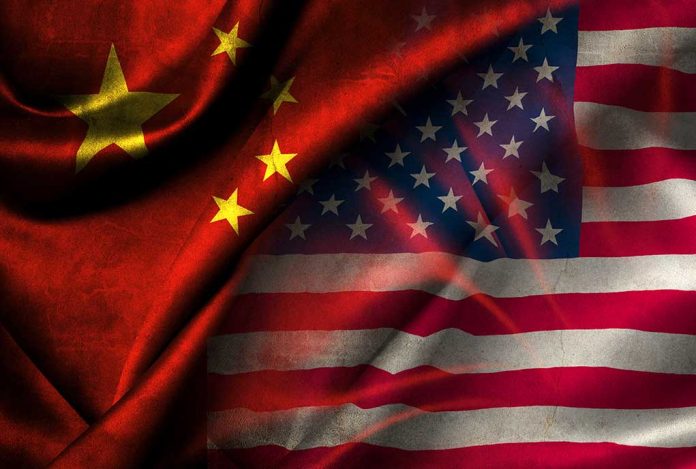
China imposes sanctions on US defense firms over Taiwan arms sales, escalating tensions between the two global powers.
At a Glance
- China sanctions nine US defense firms in response to arms sales to Taiwan
- Sanctioned companies face asset freezes and transaction bans with Chinese entities
- US remains Taiwan’s primary arms supplier despite switching diplomatic recognition to Beijing in 1979
- China views Taiwan as its territory and opposes US military cooperation with the island
- Sanctions may have limited practical impact but signal heightened tensions
China Takes Action Against US Defense Firms
The Chinese foreign ministry announced sanctions on nine US defense firms in retaliation for military equipment sales to Taiwan. This move marks a significant escalation in the ongoing dispute between China and the United States over Taiwan’s status. The sanctions will freeze these companies’ assets in China and prohibit transactions with China-based entities, potentially disrupting their operations in the region.
China’s foreign ministry spokesman, Lin Jian, strongly condemned the US arms sales to Taiwan, stating that they “seriously violated the one-China principle” and “damaged China-US relations.” This action underscores China’s determination to assert its claim over Taiwan and push back against what it perceives as US interference in its internal affairs.
China imposes sanctions on US defence firms over Taiwan arms saleshttps://t.co/uxiBIDsTtO
— Taiwan Defense (@taiwandefense) July 12, 2024
US-Taiwan Relations and China’s Response
The United States switched diplomatic recognition from Taipei to Beijing in 1979 but has maintained its role as Taiwan’s most important partner and arms supplier. This longstanding arrangement has been a persistent source of tension between the US and China. The latest sanctions are part of China’s broader strategy to pressure the US into halting military cooperation with Taiwan.
“Weapons sales by the United States to China’s Taiwan region have seriously violated the one-China principle,… seriously infringed upon China’s sovereignty and security interests, (and) damaged China-US relations,” foreign ministry spokesman Lin Jian said.
China’s actions come amid ongoing disputes with the US over trade, technology access, and territorial claims in the South China Sea. The sanctions also follow a meeting between Jake Sullivan, a top White House aide, and Chinese military official Zhang Youxia, where Zhang emphasized that Taiwan’s status is “the first red line that cannot be crossed in China-US relations.”
Implications for US Defense Companies and Taiwan
The sanctions target major US defense contractors, including units of Lockheed Martin, Raytheon, and General Dynamics. While the practical impact of these sanctions may be limited, they signal China’s willingness to use economic measures to counter US support for Taiwan. The move could complicate future arms deals and potentially affect the delivery of F-16 fighter jets, Abrams tanks, and various missiles that Taiwan is currently awaiting from the US.
“China is sanctioning six American defense companies and senior executives for their involvement in a recent US arms sale to Taiwan, according to the Chinese Ministry of Foreign Affairs.
The sale “seriously violates the one-China principle,” interferes in China’s internal affairs and undermines the country’s sovereignty and territorial integrity, according to the ministry’s statement.” – Source
Taiwan, facing increased military pressure from China’s People’s Liberation Army, is also reviving its domestic arms industry and extending mandatory military service for men to one year. These developments highlight the island’s determination to bolster its defenses in the face of growing threats from mainland China.
China sanctions 2 US defense companies and says they support arms sales to Taiwanhttps://t.co/6V5sirdCRn
— Voice of America (@VOANews) April 11, 2024
The Road Ahead: Escalating Tensions and Diplomatic Challenges
As China continues to assert its claim over Taiwan and the US maintains its commitment to the island’s defense, the potential for further escalation remains high. The sanctions on US defense firms represent just one facet of the complex and increasingly tense relationship between the world’s two largest economies. Both sides will need to navigate these challenges carefully to avoid a more serious confrontation that could have far-reaching consequences for regional stability and global trade.
The ongoing dispute over Taiwan’s status and US arms sales to the island will likely remain a critical point of contention in US-China relations for the foreseeable future. As both nations continue to assert their interests in the region, the international community watches closely, aware that the outcome of this standoff could reshape the geopolitical landscape of East Asia and beyond.
Sources:
1.China Sanctions Nine US Defence Firms In Response To Taiwan Sales
2. China sanctions nine US defense firms in response to Taiwan sales














